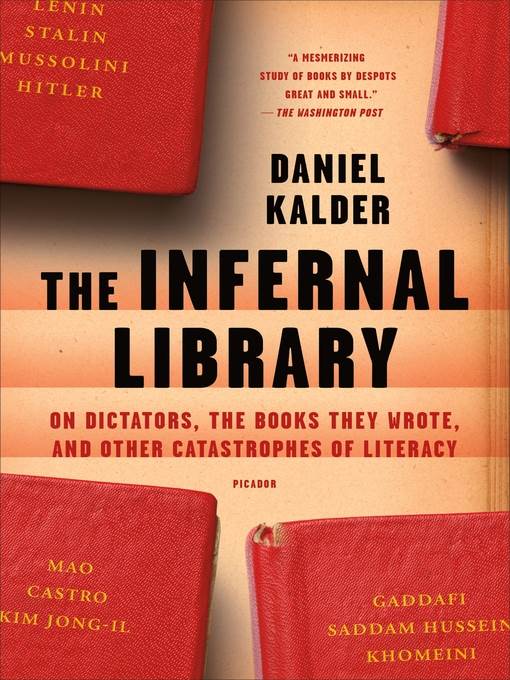
The Infernal Library
On Dictators, the Books They Wrote, and Other Catastrophes of Literacy
- اطلاعات
- نقد و بررسی
- دیدگاه کاربران
نقد و بررسی

December 15, 2017
A singular look at how dictators have gained control through literature.When asked to look back on history, we go first to significant historical events. We examine world wars, local battles, social injustices, and the dictators that have served as resistant and challenging road blocks in the peaceful evolution of society. In his latest book, Texas-based journalist Kalder (Strange Telescopes: Following the Apocalypse from Moscow to Siberia, 2009, etc.), who lived in Moscow for 10 years, explores a handful of dictators that have helped shape our conception of 20th-century history by way of the works of literature they produced. "I was struck by the fact that many dictators begin their careers as writers," writes the author, "which probably goes a long way toward explaining their megalomaniac conviction in the awesome significance of their own thoughts." Indeed, each of Kalder's subjects displayed a true passion for irreverent, revolutionary literature. The author begins with Lenin, who "resisted the impulse to deliver a full-throated demand for revolution," though "immediately after the revolution, he moved to establish part control over the written word." Stalin was "deeply provincial, describing revolutions and intellectual battles taking place far away, in more interesting places." Mussolini misidentified "his true vocation as dictator instead of writer." Hitler "desired to seduce his readers, to present himself as a child of destiny, the logical choice for the national savior" during a time of unrest. Mao defended "the primacy of evidence, research and investigation" and expressed "a desire to shut down everybody who hasn't done the work." Following a chapter on each dictator, Kalder delivers a series of focused essays on specific issues such as religion, geopolitics, ecology, technology, and the role literature played in informing the policies written in response (he touches on Castro, Kim Jong Il, Putin, and Hussein). The author renders his highly compelling narrative in a cheeky yet erudite tone that will keep readers smirking despite the monstrousness of the book's protagonists.Dictators have never looked so educated.
COPYRIGHT(2017) Kirkus Reviews, ALL RIGHTS RESERVED.

Starred review from January 1, 2018
The 20th century’s most infamous dictators were also authors, often prolific ones, complementing the atrocities they visited on humanity with crimes against literature. Kalder (Strange Telescopes), a journalist with a nimble style and an eye for leaden prose, read the significant works from this benighted subgenre, from the vast theoretical corpus of Lenin, through Stalin’s The Foundations of Leninism, Hitler’s Mein Kampf, Mussolini’s My Life, and Mao’s Little Red Book. Kalder also extends his purview to the works of latter-day autocrats Fidel Castro, Mu’ammar Gadhafi, Saddam Hussein, and Turkmenistan’s Saparmurat Niyazov, whose spiritual, autobiographical tome, The Rukhnama, which Kalder encountered while living in Moscow, began his fascination with the subject. The substance of these books is largely beside the point, since, as Kalder observes, these autocrats’ texts were not about thinking, but about repetition. Moreover, his zesty put-downs should discourage all but the most serious scholar from actually poring over them. Of Hitler’s “almost 400 pages of gibberish,” Mein Kampf, he says that it doesn’t need to be read; “to provoke unease, fear, hatred, and terror, it need only exist.” The enduring significance of these books, Kalder shows, is as totemic objects. Kalder’s work is quite an accomplishment, and is the one book people interested in the terrible writing of dictators should read.

Starred review from January 1, 2018
Hailed at its publication as a spiritual atom bomb, The Little Red Book by Mao Zedong created fallout affecting not only China's hundreds of millions but also activists and intellectuals around the globe. Kalder marvels that a volume so barren of stylistic grace and philosophical insight could eclipse every book but the Bible in popularity, even as it galvanized Chinese Communists in a zealotry that killed tens of millions through famine and violence. Tragically, Kalder counts Mao as only one of the modern dictators writing volumes justifying atrocities against ideological foes: Hitler and Mussolini, Lenin and Stalin also penned megalomaniacal books licensing attacks on (among others) Jews in Germany, kulaks in Russia. The bloody history of these books heightens Kalder's concern about more recent dictators who have published their own dangerous literary blueprints for governancethe Ayatollah Khomeini in Iran, Kim Jong-un in North Korea, Vladimir Putin in Russia, and Saparmurat Niyazov in Turkmenistan. Even readers shielded by geography and language from the influence of these dictators' books may, Kalder fears, fall under the sway of nascent dictators using the internet to disseminate screeds inculcating malicious new forms of political self-righteousness. This incisive dissection of dictatorial literature provides a potent antidote against its effects.(Reprinted with permission of Booklist, copyright 2018, American Library Association.)




دیدگاه کاربران